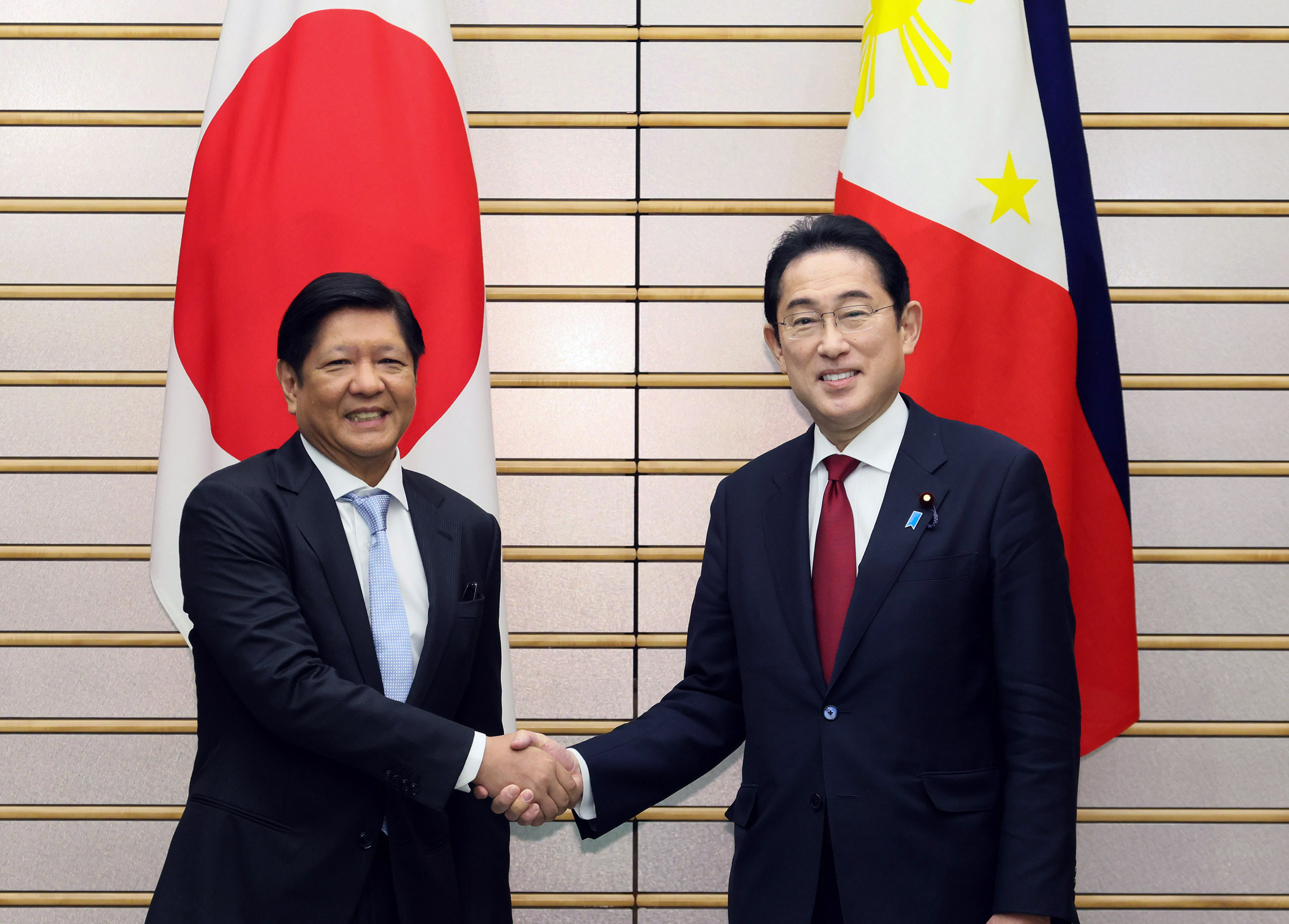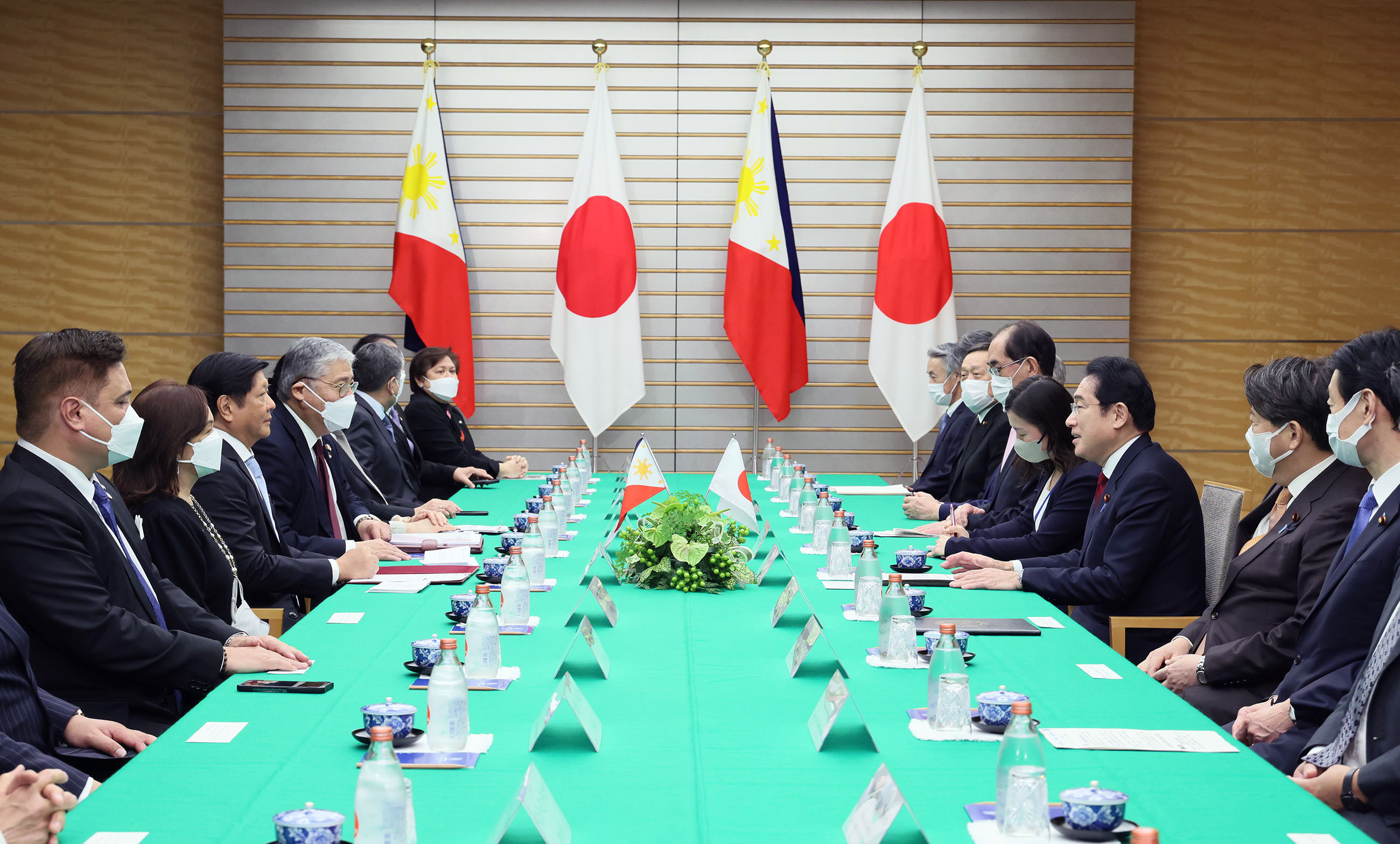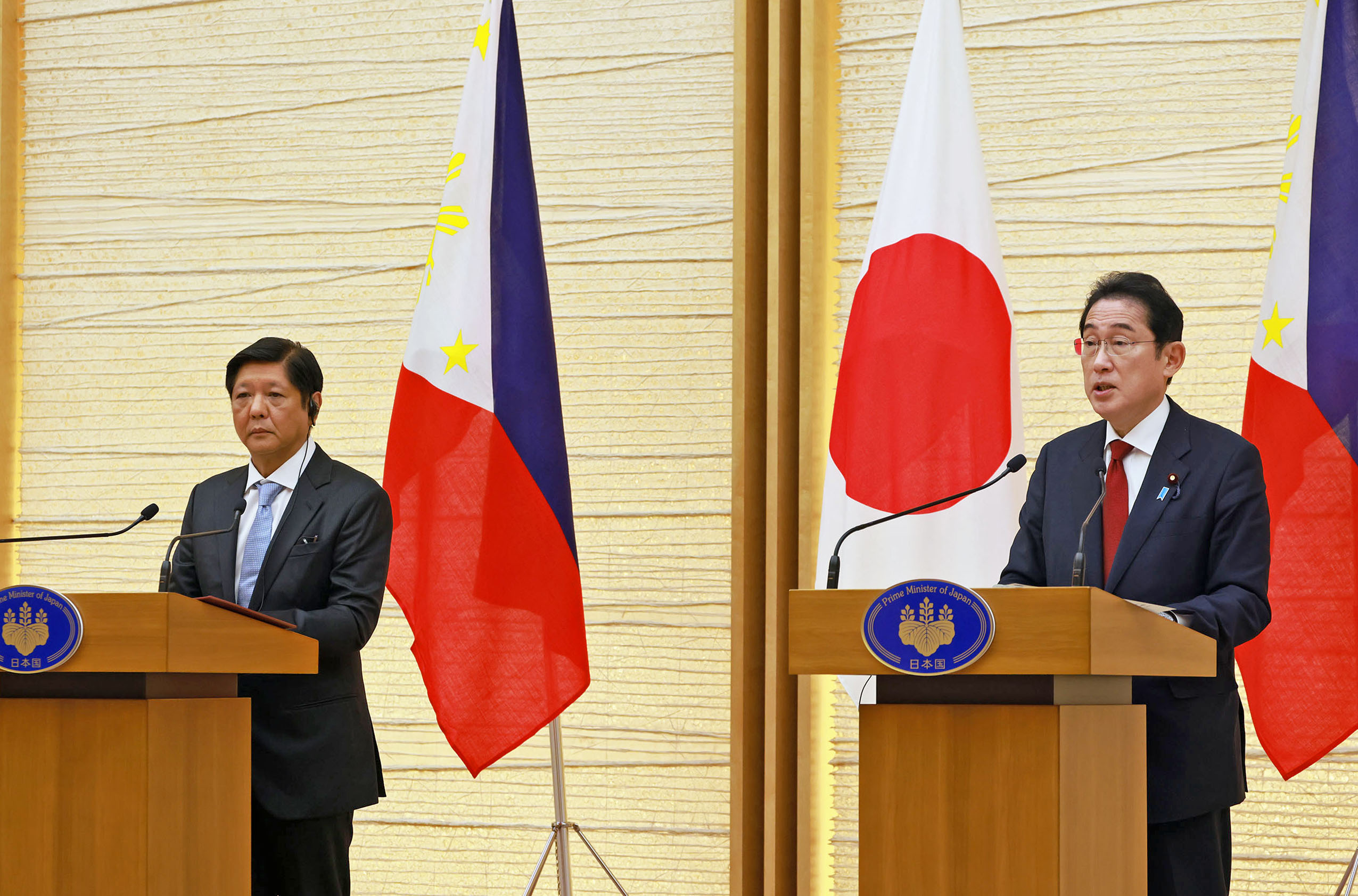Japan-Philippines Summit Meeting (Summary)
February 9, 2023
[Provisional translation]
On February 9, commencing at 6:05 p.m. for approximately 55 minutes, Mr. KISHIDA Fumio, Prime Minister of Japan, held a Summit Meeting with H.E. Ferdinand R. Marcos, Jr., President of the Republic of the Philippines, who is on an Official Visit to Japan. After the Summit Meeting, the two leaders witnessed the exchanges of outcome documents and held a joint press occasion. Following this, commencing at 7:30 p.m. for approximately 1 hour, Prime Minister and Mrs. Kishida hosted a Summit-level Working Dinner. The following is an overview of the meetings.
The Summit Meeting was attended on the Japanese side by Mr. HAYASHI Yoshimasa, Minister for Foreign Affairs, Mr. MATSUMOTO Takeaki, Minister for Internal Affairs and Communications, Mr. NOMURA Tetsuro, Minister of Agriculture, Forestry and Fisheries, Mr. NISHIMURA Yasutoshi, Minister of Economy, Trade and Industry, Mr. HAMADA Yasukazu, Minister of Defense, Mr. KIHARA Seiji, Deputy Chief Cabinet Secretary, Mr. ISOZAKI Yoshihiko, Deputy Chief Cabinet Secretary, among others ; and on the Philippine side by H.E. Gloria Macapagal Arroyo, former President of the Republic of the Philippines, Hon. Miguel F, Zubiri, President of the Senate, Hon. Ferdinand G. Romualdez, Speaker of the House of Representatives, Hon. Enrique A. Manalo, Secretary for Foreign Affairs, among others. First Lady Louise Araneta–Marcos joined the Summit-level Working Dinner.
President Marcos extended to Prime Minister Kishida an invitation to visit the Philippines at an early time, and Prime Minister Kishida accepted the invitation.
( The Japan–Philippines Joint Statement (PDF/617KB
1. Japan–Philippines Summit Meeting
(1) Opening
Prime Minister Kishida welcomed President Marcos on his maiden visit to Japan as President. Prime Minister Kishida stated that Japan attaches its importance on cooperation with the Philippines as a neighboring maritime nation, in order to maintain and strengthen the international order based on the rule of law, amid severe and complex international situations.
In response, President Marcos expressed his gratitude for hospitality that Japan accorded on his visit, and expressed his strong hope to work with Prime Minister Kishida to further develop the Japan–Philippines relations.
(2) Bilateral Cooperation
A. Economy
Prime Minister Kishida announced Japan’s contribution of ODA and private sector investment of JPY 600 billion by March 2024 to assist the economic development plan of the Philippines, including “Build Better More” program of the Marcos administration. In response, President Marcos expressed his heartfelt gratitude to Japan’s financial contribution.
The two leaders concurred to implement ODA projects as well as explore possibilities of public-private partnership (PPP) in infrastructure development such as railways, bridges and roads, among others, through the High Level Joint Committee on Infrastructure Development and Economic Cooperation. Against that backdrop, Prime Minister Kishida welcomed the signing of the Exchange of Notes concerning the provision of a Japanese loan, worth JPY 377 billion, for the development of the North–South Community Railway and its extension, and stated that Japan is ready to extend another Post-Disaster Stand-by Loan, amounting to JPY 30 billion.
The two leaders welcomed the signing of the Memoranda of Cooperation on agriculture as well as on information & communications technology (ICT). Prime Minister Kishida expressed his intention to advance concrete cooperation in the fields of maritime safety, such as development of a support base in Subic Bay, as well as in energy, health, and industrial development. In response, President Marcos expressed his appreciation for the wide range of Japan’s cooperation and conveyed his support to the “Asia Zero Emission Community (AZEC)” concept.
B. Security and Defense
Prime Minister Kishida explained the “National Security Strategy” and other documents, and President Marcos welcomed Japan’s commitment to a free and open rules-based international order. The two leaders concurred to materialize the security and defense cooperation through bilateral consultations including the Foreign and Defense Ministerial Meeting (“2+2”).
The two leaders welcomed the signing of the terms of reference (TOR) concerning the Humanitarian Assistance and Disaster Relief Activities of the Japan Self-Defense Forces (JSDF) in the Philippines, and concurred to continue to consider ways including additional frameworks to enhance and facilitate joint exercises and others between the two countries. The two leaders concurred to advance consideration to promote cooperation in defense equipment and technology as well as trilateral cooperation among Japan, the United States and the Philippines. The two leaders also shared the view to further advance cooperation in economic security, cyber security and among others.
Prime Minister Kishida also expressed Japan’s intention to continue strengthening its support toward the institution of an autonomous government in Bangsamoro in ways commensurate to the peace process, and to extend cooperation in the Sulu–Celebes Seas and their surrounding areas. President Marcos expressed his deep appreciation to Japan’s continued support to the Mindanao peace process, which has led to peace and contributed to the development of the region.
C. People-to-People Exchanges
Prime Minister Kishida announced visa exemption mainly for Philippine government officials. President Marcos welcomed Japan’s announcement and expressed his hope to build upon this momentum to further facilitate people-to-people exchanges between the two countries.
D. Others
As for the widespread robbery and fraud cases in Japan, Prime Minister Kishida touched on the fact that necessary cooperation has been conducted between the relevant authorities of the two countries, and he asked for continued collaboration between the authorities.
2. Japan–Philippines Summit-level Working Dinner
(1) The two leaders reaffirmed that a “Free and Open Indo-Pacific (FOIP)” and “ASEAN Outlook on the Indo-Pacific (AOIP)” share fundamental principles.
(2) The two leaders shared the view that they looked forwardto jointly announcing a new vision for the future ASEAN–Japan relations on the occasion of the ASEAN–Japan Commemorative Summit for the 50th Year of ASEAN-Japan Friendship and Cooperation in Tokyo around December.
(3) The two leaders expressed serious concern about the situation in the East and South China Seas and strongly opposed the actions including force or coercion that may increase tensions. The two leaders also expressed concern for and strong opposition to economic coercion, and affirmed the importance of transparent, fair development finance.
(4) On the situation in Ukraine, the two leaders reaffirmed their position, as demonstrated in the United Nations Resolution, dated March 2, 2022, which deplored in the strongest terms the aggression by the Russian Federation against Ukraine and its complete and unconditional withdrawal from the territory of Ukraine. In this context, the two leaders stressed that the use or threat of nuclear weapons is unacceptable. The two leaders also strongly opposed any attempt to jeopardize the foundation of the international order which does not accept any change of the internationally recognized borders by force or coercion affecting Europe and any part of the world.
(5) The two leaders condemned the abductions of Japanese citizens by North Korea over the years, and affirmed to urge North Korea to immediately resolve the abductions issue. The two leaders also condemned North Korea’s ongoing development of nuclear weapons and ballistic missiles including the unprecedented number of ballistic missiles launches last year, and reiterated their commitment to achieving the complete, verifiable and irreversible dismantlement of all weapons of mass destruction and ballistic missiles of all ranges of North Korea.
(6) The two leaders reaffirmed their support for ASEAN’s efforts to improve the situation in Myanmar through the Five-Point Consensus.
(7) As for nuclear disarmament and nonproliferation, with a view to maintaining and strengthening the Treaty on the Non-Proliferation of Nuclear Weapons (NPT) as the cornerstone of the international nuclear disarmament and non-proliferation regime, the two leaders reaffirmed their intention to work closely, including through activities in the framework of the Non-Proliferation and Disarmament Initiative (NPDI), toward the 11th NPT review conference.
3. Document Exchange Ceremony and Joint Press Occasion
In the presence of the two leaders, the following documents in relation to bilateral cooperation were exchanged.
・Exchange of Notes concerning the North–South Commuter Railway (NSCR) Extension Project (II)
・Exchange of Notes concerning the NSCR (Malolos–Tutuban) Project (II)
・Loan Agreement for the NSCR Extension Project (II)
・Loan Agreement for the NSCR (Malolos–Tutuban) Project (II)
・Terms of Reference concerning the Humanitarian Assistance and Disaster Relief Activities of the JSDF
・Memorandum of Cooperation on Agriculture
・Memorandum of Cooperation on ICT
After the Document Exchange Ceremony, the two leaders held a Joint Press Occasion.


